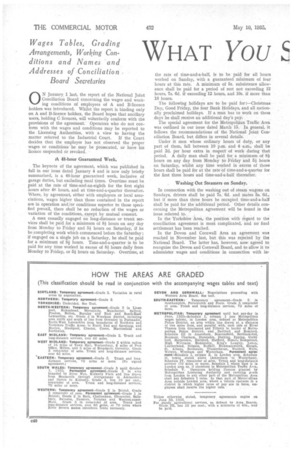WHAT You
Page 98

If you've noticed an error in this article please click here to report it so we can fix it.
Board Secretaries
ON January. 1 last, the report of the National Joint Conciliation Board concerning the wages and working conditions of employees of A and B-licence holders was introduced. Whilst the report is binding only on A and B-licence holders, the Board hopes that ancillary users, holding C. licences, will voluntaiily conform with the provisions of the agreement" Operators who do not conform with the wages and conditions may be reported to the Licensing Authorities, with a view to having the
matter referred to the Industrial Court. If the Court decides that the employer has not observed the proper wages or conditions he may be prosecuted, or have his licence suspended or revoked.
rik 48-hour Guaranteed Week.
The keynote of the agreement, which was published in full in our issue dated January 4 and is now only briefly summarized, is a 48-hour guaranteed week, inclusive of garage duties, but excluding meal times. Overtime must be paid at the rate of time-and-an-eighth for the first eight hours after 48 hours, and at time-and-a-quarter thereafter. Where, by agreement, either with employers or local associations, wages higher than those contained in the report are in operation and/or conditions superior to those specified prevail, there shall be no reduction of the wages or variation of the conditions,. except by mutual consent
A man casually engaged on long-distance or trunk services shall be paid for a minimum of 8-i hours on any day from Monday to Friday and l4 hours on Saturday, if he be completing work which commenced before the Saturday ; if engaged on a single job on a Saturday, he shall be paid for a minimum of St hours. Time-and-a-quarter is to be paid for any time worked in excess of 8i hours daily from Monday to Friday, or 5i hours on Saturday. Overtime, at the rate of time-and-a-half, is to be paid for all hours worked on Sunday, with a guaranteed minimum of four hours at this rate. A minimum of 5s. subsistence allowance shall be paid for a period of rest not exceeding 12 hours, 7s. 6d, if. exceeding 12 hours, and 10s. if more than 18 hours.
The following holidays are to be paid for :—Christmas Day, Good Friday, the four Bank Holidays, and all nationally proclaimed holidays. If a man has to work on these days he shall receive an additional day's pay.
The special agreement for the Metropolitan Traffic Area was outlined in our issue dated March 15. In general, it follows the recommendations of the National Joint Conciliation Board, but differs in several details.
Under it men whose ordinary hours of duty, or any part of them, fall between 10 p.m. and 4 a.m., shall be paid 2d. per hour extra in respect of work during that period. A daily man shall be paid for a minimum of 8i hours on any day from Monday to Friday and 5i hours on Saturday, whilst any time worked in excess of those hours shall be paid for at the rate of time-and-a-quarter for the first three hours and time-and-a-half thereafter.
Washing Out Steamers on Sunday.
In connection with the washing out of steam wagons on Sundays, drivers shall be paid 7s. 6d. and mates 5s. 6d., but if more than three hours be occupied time-and-a-half shall be paid for the additional period. Other details concerning the Metropolitan agreement will be found in the issue referred to.
In the Yorkshire Area, the position with fegard to the conciliation agreement is most complicated, and no final settlement has been reached.
In the Devon and Cornwall Area an agreement was reached in November last, but this was rejected by the National Board. The latter has, however, now agreed to recognize the Devon and Cornwall Board, and to allow it to administer wages and conditions in connection with in




































































































































































